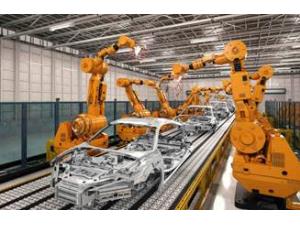



Date:27/06/19
 A new report released by Oxford Economics, titled “How robots change the world”, suggests that over 20 million people – about 8.5 percent of the global manufacturing workforce – may lose their jobs to robots by 2030, with one industrial robot eliminating an average of 1.6 jobs in the sector.
A new report released by Oxford Economics, titled “How robots change the world”, suggests that over 20 million people – about 8.5 percent of the global manufacturing workforce – may lose their jobs to robots by 2030, with one industrial robot eliminating an average of 1.6 jobs in the sector.
However, the study also finds that the spread of industrial robotics will lead to increased productivity and growth, creating new jobs to replace some of those that were lost initially.
Robots are starting to become cheaper than human workers in some areas – the average unit price of a robot has dropped by 11 percent between 2011 and 2016, according to the report. At the same time, they can now do more sophisticated tasks in more varied environments.
The economic effect of a 30 percent rise over the current robot installation rate by 2030 would be a 5.3 percent increase in global GDP.
But despite the economic growth, income inequality might increase as a result of the automation. The more dependent on low-productivity or low-skilled labour a region is, the more vulnerable it will be to robots taking over human jobs, and it is unlikely for the number of new jobs created because of the economic growth to equal the number of jobs that are lost in regions with poorer, lower-skilled populations.
“This great displacement will not be evenly distributed around the world, or within countries,” according to the report. “Our research shows that the negative effects of robotization are disproportionately felt in the lower-income regions compared with higher-income regions of the same country.”
In general, the study says, urban areas will do well in this context of high automation, while rural areas will be left behind. This brings new challenges for policy makers, who will have to find ways to mitigate the effect of robotics and automation on different regions and groups of people.
Robots could take over 20 million manufacturing jobs worldwide by 2030, study finds
 A new report released by Oxford Economics, titled “How robots change the world”, suggests that over 20 million people – about 8.5 percent of the global manufacturing workforce – may lose their jobs to robots by 2030, with one industrial robot eliminating an average of 1.6 jobs in the sector.
A new report released by Oxford Economics, titled “How robots change the world”, suggests that over 20 million people – about 8.5 percent of the global manufacturing workforce – may lose their jobs to robots by 2030, with one industrial robot eliminating an average of 1.6 jobs in the sector.However, the study also finds that the spread of industrial robotics will lead to increased productivity and growth, creating new jobs to replace some of those that were lost initially.
Robots are starting to become cheaper than human workers in some areas – the average unit price of a robot has dropped by 11 percent between 2011 and 2016, according to the report. At the same time, they can now do more sophisticated tasks in more varied environments.
The economic effect of a 30 percent rise over the current robot installation rate by 2030 would be a 5.3 percent increase in global GDP.
But despite the economic growth, income inequality might increase as a result of the automation. The more dependent on low-productivity or low-skilled labour a region is, the more vulnerable it will be to robots taking over human jobs, and it is unlikely for the number of new jobs created because of the economic growth to equal the number of jobs that are lost in regions with poorer, lower-skilled populations.
“This great displacement will not be evenly distributed around the world, or within countries,” according to the report. “Our research shows that the negative effects of robotization are disproportionately felt in the lower-income regions compared with higher-income regions of the same country.”
In general, the study says, urban areas will do well in this context of high automation, while rural areas will be left behind. This brings new challenges for policy makers, who will have to find ways to mitigate the effect of robotics and automation on different regions and groups of people.
Views: 355
©ictnews.az. All rights reserved.Similar news
- Azerbaijani project to monitor disease via mobile phones
- Innovative educational system to be improved under presidential decree
- NTRC prolongs license of two TV and radio organizations for 6 years
- Azerbaijan establishes e-registry for medicines
- Azerbaijani museum introduces e-guide
- Nar Mobile opens “Nar Dunyasi” sales and service center in Siyazan city
- International conference on custom electronic services held in Baku
- OIC secretary general to attend COMSTECH meeting in Baku
- Azerbaijan develops earthquake warning system
- New law to regulate transition to digital broadcasting in Azerbaijan
- Azerbaijani State Social Protection Fund introduces electronic digital signature
- Intellectual traffic management system in Baku to be commissioned in December
- Tax Ministry of Azerbaijan started receiving video-addresses
- World Bank recommends Azerbaijan to speed up e-service introduction in real estate
- Azerbaijan to shift to electronic registration of real estate





















